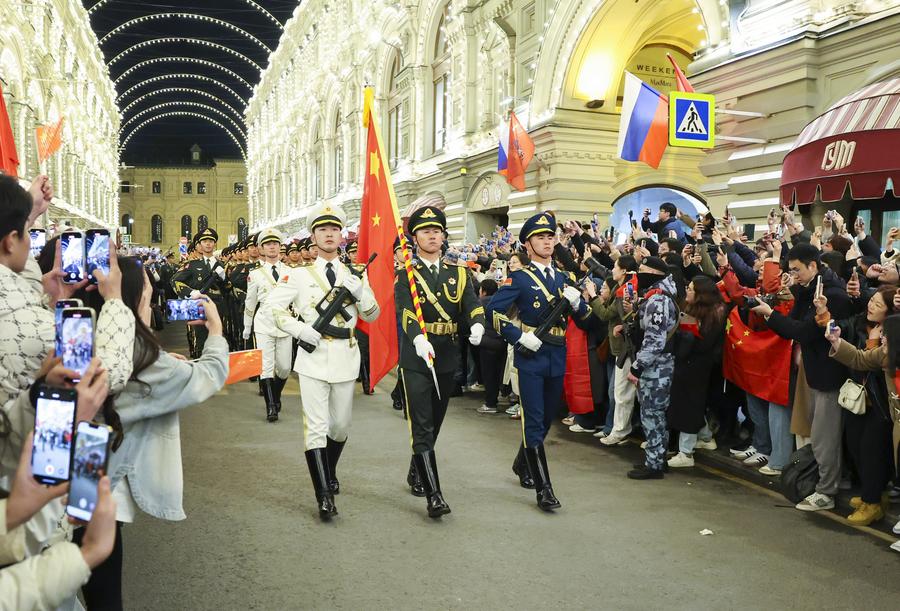
MOSCOW - China and Russia vowed to strengthen cooperation to safeguard the authority of the international law, the two countries said on Thursday.
Both countries made the remarks in a joint statement on further deepening the China-Russia comprehensive strategic partnership of coordination for a new era that was signed by Chinese President Xi Jinping and Russian President Vladimir Putin.
The two countries pledged to firmly uphold the international system with the United Nations at its core and the international order underpinned by international law, and defend the central role of the UN in international affairs, the joint statement showed.
The codification and progressive development of international law must take into account the reality of the UN-led multipolar world. China and Russia support the broadest possible participation of all countries in UN treaties and their uniform interpretation and application.
The two countries reiterate their full commitment to the UN Charter, the 1970 Declaration on Principles of International Law Concerning Friendly Relations and Cooperation among States in Accordance with the Charter of the United Nations and the integral and interdependent nature of the fundamental principles of international law explicit in the declaration.
The principles of international law are the cornerstone for a multipolar world system, just and equitable international relations featuring win-win cooperation, the building of a community with a shared future for mankind, and establishing common space of equal and indivisible security and economic cooperation.
The two countries reaffirm that states must not violate the principle of the UN Charter that prohibits the threat or use of force, and accordingly condemn unilateral military intervention that is not based on individual or collective self-defense or not carried out by resolutions adopted by the Security Council under Chapter VII of the Charter.

Both sides jointly believe that all countries have the right to independently choose their development models and political, economic, cultural and social systems based on their national conditions and the will of their people. No country's development model should be regarded as special or superior to others. They condemn any act of interfering in the internal affairs of another country to forcibly changing its legitimate government, reiterating peaceful settlement of disputes.
China and Russia also strongly oppose unilateral sanctions and long-arm jurisdiction. They oppose and condemn unilateral sanctions that violate international law, especially those sanctions that violate the principles of sovereign equality, state immunity and non-interference in internal affairs of states and are not authorized by the Security Council, as well as drawing lines along ideological differences. They emphasize that states have the right to carry out normal economic and trade cooperation.
ALSO READ: China-Russia bilateral trade poised for steady growth
China and Russia oppose the practice of double standards or imposition by some states of their will on other states, and reject any attempt to undermine, in the name of "rule of law" or "rules-based order", other countries' legitimate rights and interests as well as peace and stability. The adoption of unilateral compulsory measures by some countries aside from measures adopted by the UN Security Council would obstruct the objects and purposes of measures imposed by the Security Council and undermine their integrity and effectiveness.
Both countries agree that domestic and multilateral criminal justice mechanisms must not be abused out of narrow political purposes to undermine international relations and the rights enjoyed by states under international law.
China and Russia also call for concerted efforts to strengthen arms control and disarmament, prevent the placement of weapons in outer space, and address such global challenges as climate change, plastic pollution and communication technology crimes.
Cold War mentality
Urging nuclear-weapon states to abandon the Cold War mentality and zero-sum games, China and Russia emphasized in the joint statement the importance of maintaining a constructive relationship among major countries in addressing global strategic issues.
Noting that nuclear-weapon states bear special responsibilities for international security and global strategic stability, the statement showed that they should give up taking measures that trigger strategic risks, and concerns should be addressed through equal dialogue and consultations based on mutual respect to enhance trust and avoid dangerous misjudgments.
The statement noted that not all nuclear-weapon states follow the above-mentioned position, saying the rising tensions among nuclear-weapon states have escalated, even to the point of facing direct military conflicts, adding that problems and challenges in the strategic domain keep emerging, and the risk of nuclear conflicts is rising.
The fact that certain nuclear-weapon states build or expand permanent military bases in sensitive areas around other nuclear-weapon states, flex military muscle to exert pressure, or carry out hostile acts that threaten the core security interests of other countries has become one of the most urgent strategic risks to be eliminated, said the two countries.
Unilateral restrictive measures
In the same statement, China and Russia stressed that they firmly oppose unilateral and unlawful restrictive measures such as trade and financial restrictions.
Both sides pointed out that certain countries and their allies have imposed such measures, significantly increased tariffs, and used other non-market-oriented means of competition, which have had a negative impact on the world economy, undermined fair competition and hindered international cooperation in addressing common challenges facing all mankind, including hindering the maintenance of global food security, energy security and the achievement of the UN Sustainable Development Goals.
The two countries condemned the shameless acts of bypassing the UN Security Council to implement measures that violate the Charter of the UN and international law, obstruct justice and violate the rules of the World Trade Organization.
ALSO READ: Xi: China, Russia find right path of state-to-state interactions
China and Russia will continue to join hands to deal with the downward pressure on the world economy, and facilitate the participation of more Global South countries in international and regional trade.
US 'double containment'
The two countries will also enhance coordination and cooperation to resolutely respond to the "double containment" policy pursued by the United States, according to the joint statement.
Both sides firmly oppose the act of inciting other countries around the world to take hostile positions towards China and Russia and smear China-Russia collaboration, said the two countries.
In the statement, both sides also expressed deep concern over the confrontational policies adopted by certain countries and their allies as well as the related remarks they made, calling for ending the acts of interfering in other countries' internal affairs, undermining the existing security architecture in various regions around the world, and artificially drawing lines among countries and advocating camp confrontation.
Both sides pointed out that the United States and its allies are attempting to advance NATO eastward into the Asia-Pacific region, creating a "small circle" in the region, and enticing countries in the region to implement their "Indo-Pacific Strategy", thereby undermining regional peace, stability and prosperity.
Both countries voiced opposition to the establishment of a "nuclear-sharing" military alliance against China and Russia, the arrangement of deploying nuclear weapon systems in the region under the pretext of strengthening "extended deterrence", and the deployment of global anti-missile systems and land-based medium-range missile systems that undermine strategic stability, according to the statement.
A model of relations, cooperation
China and Russia have set a model for the world on building new-type international relations as well as on developing cooperation between major countries and between the countries as each other's biggest neighbor, the bilateral joint statement pointed out.
The statement noted that the relations between China and Russia have reached the highest level in history with a steady and across-the-board development.
ALSO READ: Xi: Friendship forged with blood, lives source of China-Russia amity
China and Russia are each other's important trade partner, and the two sides agree that the bilateral mutually beneficial cooperation has strongly contributed to the improvement of the well-being of the two peoples, according to the statement.
In efforts to further enhance the cooperation, China and Russia agree to push for a stable expansion of two-way trade with an optimized structure through lifting the share of high-tech products and fostering innovative forms of e-commerce, among other efforts.

Victorious outcome of WWII
Agreeing to firmly defend the victorious outcome of the World War II, China and Russia vowed to resolutely crush any act that attempts to tamper with WWII history, smear the historical achievements of China and Russia in WWII, or tarnish the image of the liberators. The two sides strongly condemn the acts to desecrate or damage memorial facilities of WWII martyrs.
In the joint statement, the two countries described WWII as an unprecedented catastrophe in human history, noting that China and the Soviet Union were the main battlefields in Asia and Europe, and served as the mainstay of resistance against militarism and fascism.
ALSO READ: Celebration of anti-fascist war victory reflects Russia-China friendship
The Chinese people and the Soviet people have made great historical contributions to safeguarding human dignity and restoring world peace, it added.
In today's world, China and Russia shoulder a shared responsibility and mission of maintaining a correct historical perspective on WWII and the two sides will always remember the just feat of the two peoples in maintaining world peace, the statement showed.
Post-war order
Expressing concerns over attempts to subvert the post-war international order, the two sides also pointed out that in pursuit of hegemonic interests, certain countries and their allies are attempting to distort the outcomes of the victory of World War II and weaken the core role of the UN in maintaining global peace and security.
In the joint statement, the two countries reaffirmed their commitment to abiding by international law, resisting any attempt to distort the basic principles of international law.
The two sides noted that it's the major trend of the times to build the order for a fairer and sustainable multipolar world.
Certain countries are indulging in hegemonism and neo-colonialism, wantonly implementing aggressive policies, restricting the sovereignty of other countries and suppressing the economic, technological development of other countries in order to secure their own privileges, the statement pointed out, stressing that this goes against the trend of world multipolarization and democratization of international relations.
ALSO READ: UN envoy emphasizes China's role in victory over fascism
As independent forces in the process of building a multipolar world, the two sides pledged in the statement to fully tap the potential of bilateral relations, uphold the international system with the United Nations at its core and the basic norms governing international relations based on the purposes and principles of the UN Charter, and push the realization of an equal and orderly multipolar world as well as the democratization of international relations.

UN's role in AI governance
In the same statement, China and Russia expressed support for the UN to play a central role in the governance of artificial intelligence.
The two sides emphasized the importance of respecting national sovereignty and adhering to the laws of each country as well as the UN Charter during the process.
They reiterated their commitment to jointly promoting the good, universal and beneficial development of AI, believing that machine learning is conducive to promoting the economic and social development of all countries and should not become a geopolitical tool for certain countries to maintain hegemony.
Both sides opposed the politicization of science and technology issues and the negative practice of maliciously disrupting the stability of the international AI industrial chain and supply chain.


